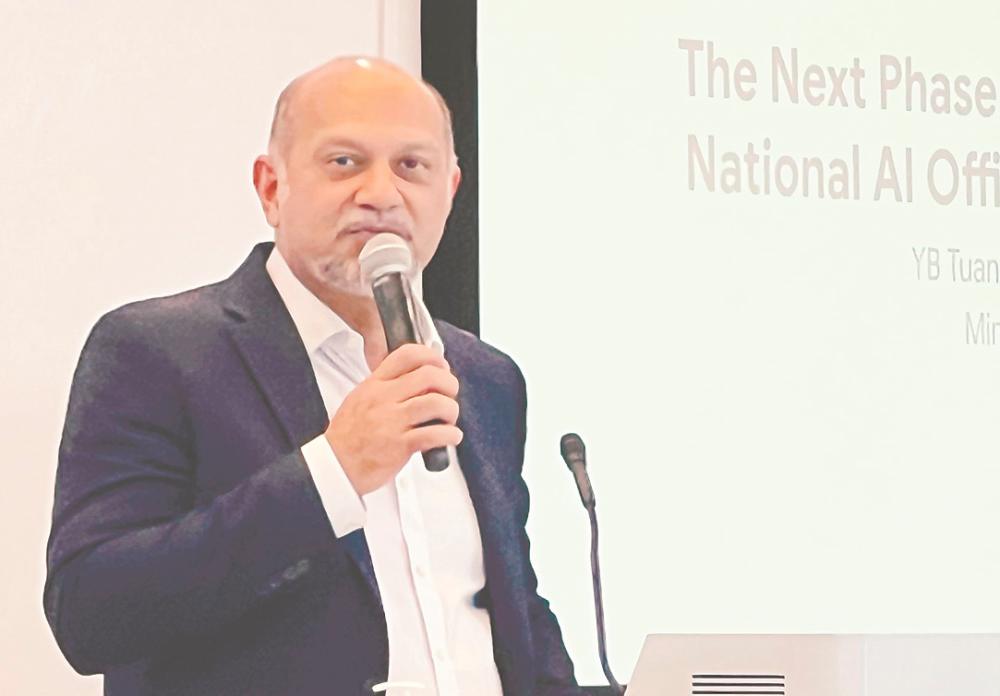KUALA LUMPUR: Malaysia is set to introduce guidelines on ethical use of general artificial intelligence (AI) by the end of this month, as part of the government’s broader efforts to regulate AI adoption while ensuring responsible and secure practices.
Digital Minister Gobind Singh Deo emphasised the need for a structured framework to address concerns such as bias, misinformation and responsible AI deployment.
“The new guidelines are expected to provide clarity on AI usage within general usage, ensuring that AI tools are used ethically and transparently,” he said at the “AI at Work” joint press briefing held by the Digital Ministry and Google Cloud today.
Gobind said the government has been engaging with multiple stakeholders, including technology companies such as Google, Microsoft and Intel, to develop training programmes and AI initiatives that align with Malaysia’s digital economy strategy. “The upcoming guidelines will help define best practices for AI implementation while mitigating risks associated with emerging technologies.”
They will also address concerns over AI-generated misinformation and bias in decision-making, Gobind said.
“As AI models are trained on vast datasets, there is growing concern that they may unintentionally favour certain perspectives or reinforce existing biases. The government aims to establish mechanisms to ensure that AI tools used in the public sector remain neutral, reliable, and aligned with national interests,” he added.
Gobind said one of the key aspects of Malaysia’s AI strategy is its large-scale training initiative, which will see 445,000 public officers upskilled at no cost in the collaboration with Google Cloud.
“This effort is part of the government’s commitment to equipping its workforce with digital skills, ensuring that Malaysians can effectively leverage generative AI while adhering to ethical and regulatory standards. Training will be targeted, ensuring that the right groups receive the appropriate AI education to maximise its benefits.”
Gobind stressed that data sovereignty and security are major priorities, given that much of Malaysia’s AI infrastructure relies on foreign-developed technologies.
He said discussions are ongoing to ensure that data remains within national jurisdiction, reducing risks related to data privacy and control. “The government is also working on cloud policies that will further enhance Malaysia’s digital independence.”
The minister noted that Malaysia has been proactive in AI adoption, with programmes such as “AI for Rakyat” attracting more than a million users in less than five months.
“Following this success, the government is expanding its AI education initiatives to include cybersecurity and blockchain literacy. However, with the rapid expansion of AI, there is a pressing need for ethical oversight to prevent misuse and ensure that AI serves the public good.”
Apart from the ethical guidelines, Gobind said, the government is also targeting to establish a Data Safety and Trust Commission by the end of the year.
“These entities will be responsible for overseeing AI governance, ensuring compliance with ethical standards, and addressing challenges related to AI transparency and accountability. The commission will also play a key role in setting regulations for AI-generated content in media and public communication,” he added.
With the AI ethics guidelines set for release by the end of the month, Gobind said, Malaysia is taking a significant step toward balancing innovation with accountability. “The government’s proactive approach to AI regulation will help foster trust in emerging technologies while ensuring that AI-driven solutions align with ethical and national interests.”









